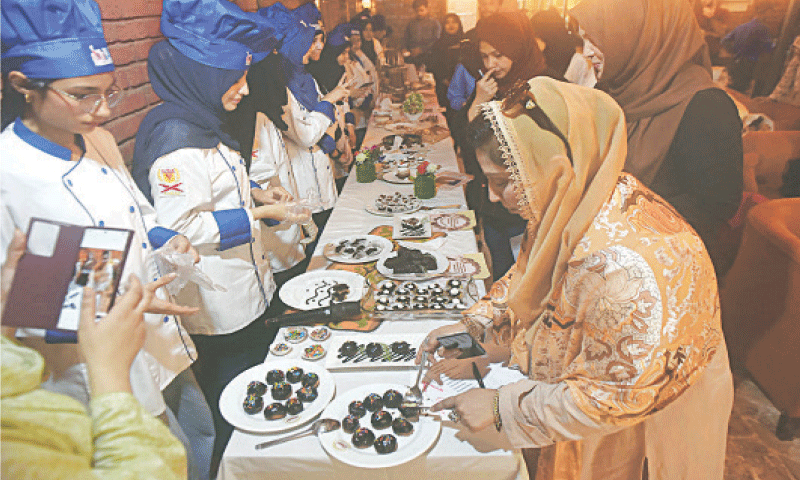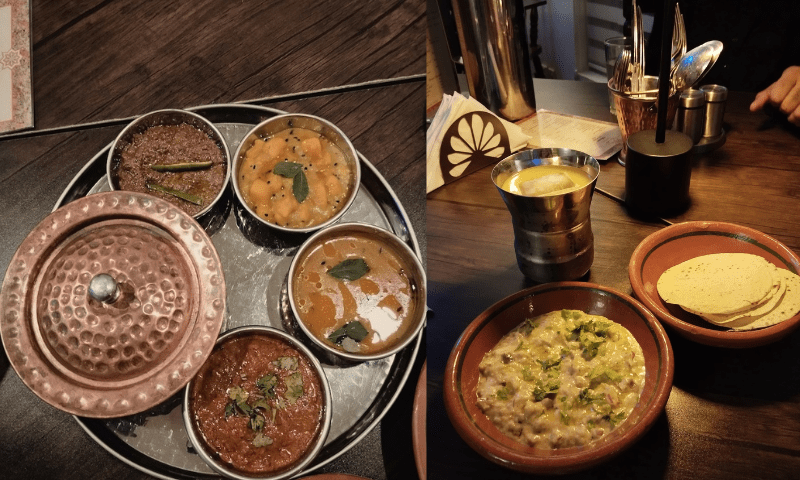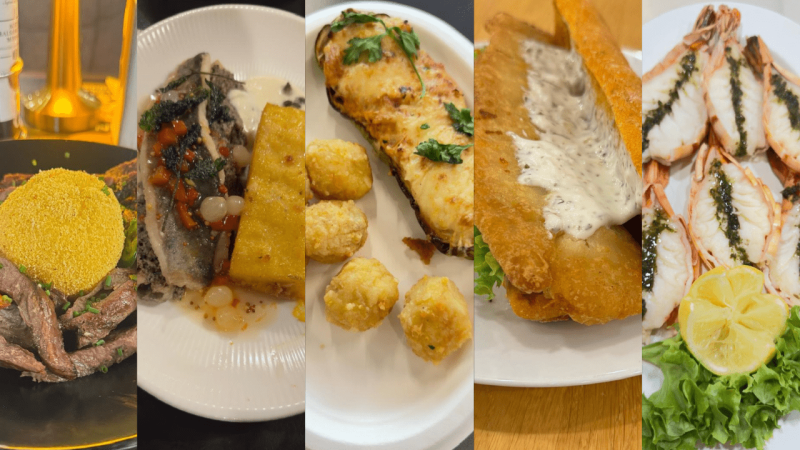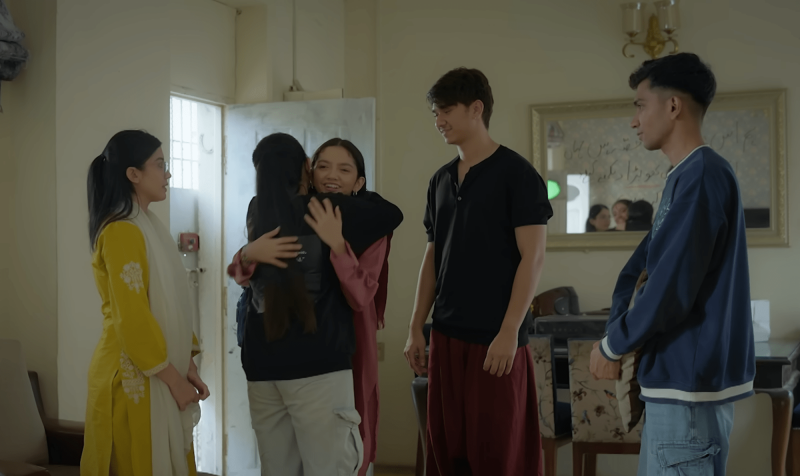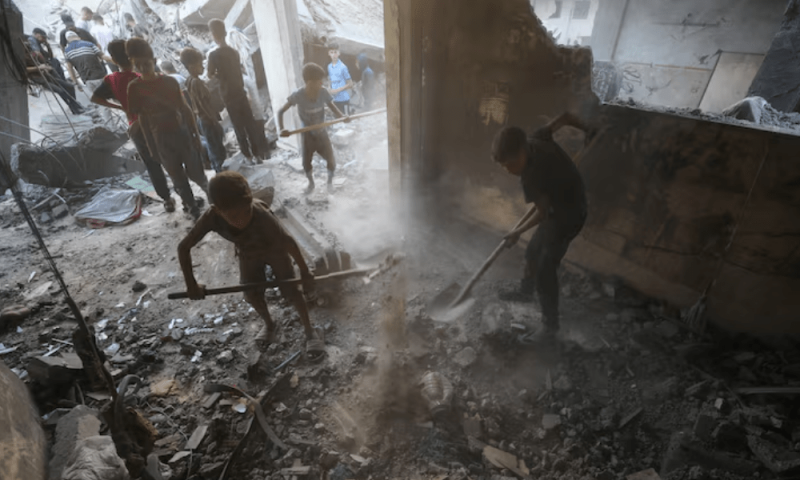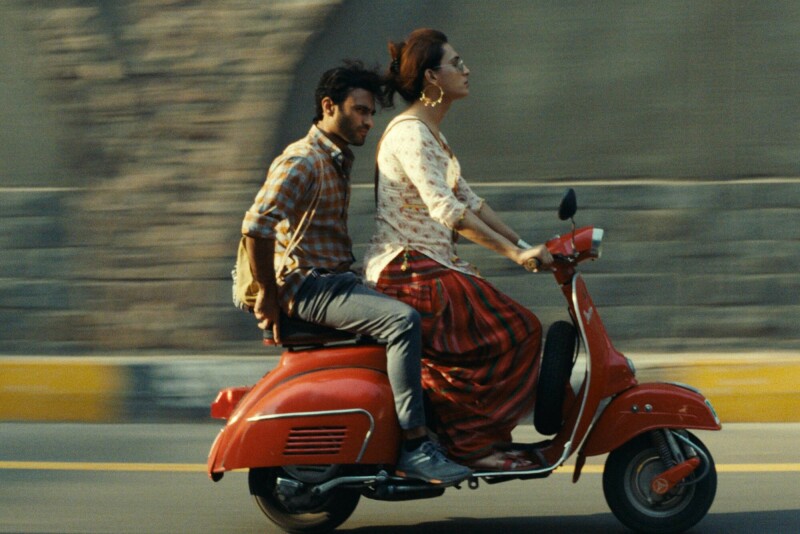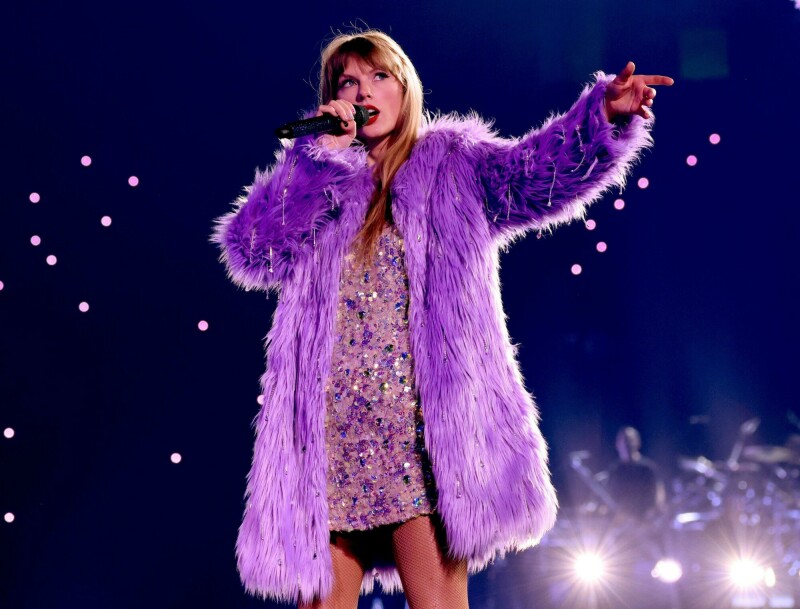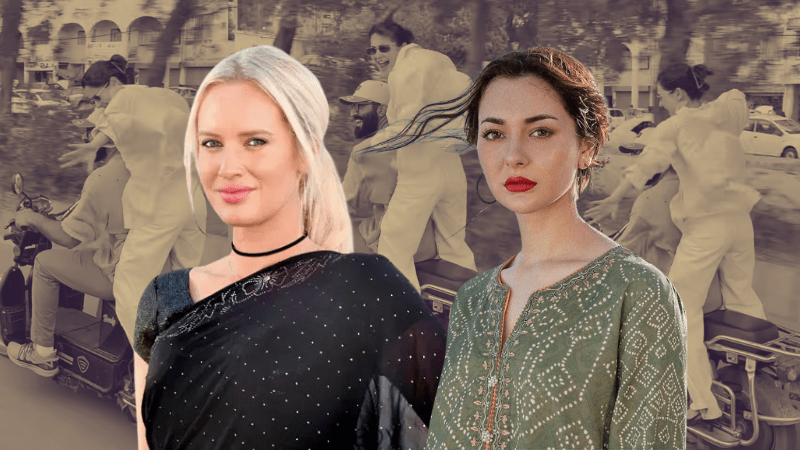Food: My quest for the best kulfi faluda in Lahore
Come summer in Pakistan and those who can afford it jet off to exotic foreign locales to cool off, while some head to the hills in the north. Those that can’t do either, well, they don’t do anything. Except eat, that is, with a heavy preference for ice cream, gelato, and of course — kulfi faluda.
Undoubtedly one of the best ‘coolants’ to eat/drink in the summer is rich, creamy, milky faluda. It’s not just rich in flavour, but, according to its sellers, it cleanses the body from inside, cooling it off. And with the kind of summer our part of the world endures, we need lots of it.
Faluda is a thick, cold beverage/dessert, especially popular here in the subcontinent. It is usually prepared by cooking congealed milk or khoya with milk for hours and hours until the mixture is thick; it is then left to cool and then ideally served with arrowroot or wheat starch vermicelli and a sweet syrup.
Variations include a block or cone of kulfi, basil seeds or tukh malanga, crushed almond, rose water, fruit, jelly, Panadanas syrup or kewra and what not. When served with kulfi, it’s called ‘kulfi faluda’. Before being added to a faluda, the tukh malanga are soaked in water so they can swell and become soft and jelly-like. They hardly have a flavour, but just add a slimy texture to faluda, which isn’t too bad.
First, a little history...
Originally called Paloodeh or Pālūde, this tasty treat is an improvisation of the Persian dessert called faloodeh. It is a traditional Iranian dessert that originates from Shiraz in Iran where it is famous as ‘Shirazi Faloodeh’. It is believed to have been brought to the Indian subcontinent during the Mughal era. According to one of the stories, Mughal emperor Jahangir was fond of having faluda with cream and fruit.
In the south of Bangladesh, a variant of faluda is made with Pandanas extract, pistachios, Shagu pearls, creamed coconut and mango as well as milk and vermicelli. Some Bangladeshis like to add strong black tea to get a distinct flavour out of it.
It is also very similar to Thai drink nam manglak, which is made with shredded jelly, tapioca pearls, Job’s Tears mixed with sugar, water and rose water. Several other countries, such as South Africa, Mauritius and Iraq have their own versions of this delicacy.
The quest for the perfect faluda begins...
With the sweltering summer having arrived in Lahore, I decided to get my first taste of this heavenly dessert and explore where I can get the real deal from.
This quest was very different from my previous — wherein I was searching for the perfect nihari in Lahore. Nevertheless it was a challenge that I was determined to conquer!
Also read: My quest for the best nihari in Lahore
I claim to have a huge sweet tooth and anything sweet is a weakness, from jalebi to ras malai to mithai to cakes, pastries and tarts to halwas. The list is endless (and mouth watering). So I couldn’t resist the temptation to eat faluda as soon the thought crossed my mind.
Lahore has way too many options to choose from when it comes to faluda, and in all forms and variations. I’ve had a couple of varieties before but this time I thought I’d look for the best among the many names around town. I was off from work, so I called up a friend who picked me up in no time on his bike and off we went after dinner.
Mashallah Nafees Kasuri Faluda
The faluda from Punjab’s city Kasur is the most popular here, as are that city’s andrassas and fish. So naturally, I decided my first stop will be ‘Mashallah Nafees Kasuri Falooda’ on main Ichhra road. They claim to sell the original Kasuri faluda.
 |
| Mashallah Kasuri prides itself on the authenticity of their faluda recipe — Photo by the author |
As soon as we arrived in front of the shop, I was struck by the interior. Decorated with mirrors of all shapes and sizes, it was unlike any other faluda shop I had visited. The first thing I uttered as soon as I saw it was: “What’s with this Sheesh Mahal here?” I was impressed; the place was spick and span with neatly set tables and a large counter behind which the owner sat taking payments and orders. The only thing missing was a maharani, since the place looked like a royal darbar.
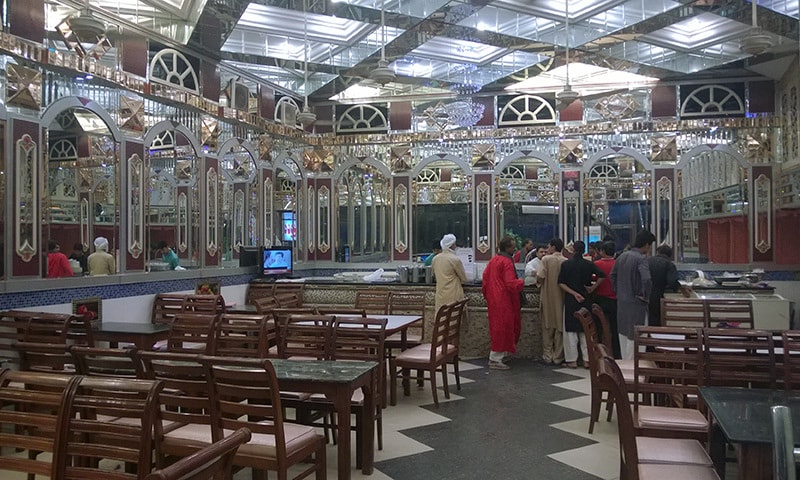 |
| Its sparkling interior makes Mashallah Nafees Kasuri Faluda stand out from the other faluda shops in the city — Photo by the author |
We found ourselves a table, sat down and placed our order, which was just one bowl of faluda that my friend and I intended to share. We ordered a small one, but what was served was bigger than what I expected. And accompanying it was a small bowl of ice. It was only later that we found out they sold one-size servings, unlike their competitors who offered small and large portions.
 |
| A large bowl of five-layer faluda with extra ice — Photo by the author |
The faluda was laid out in the bowl in five layers: the sheera (syrup), vermicelli, a block of qulfi, crushed ice and rabri. I had never had faluda like this.
On asking the waiter about the layers and the accompanying extra ice, we were told that this is how the delicacy is served in Kasur. I also notice that there’s no tukh malanga because I’ve always had faluda with it and thought it was an essential element.
“The rabri is actually not sweet. The whole thing is made sweet by that syrup at the bottom and a small quantity of sugar in the kulfi that you can choose to remove. So basically, those who want a sugar-free faluda can do away with the sheera. And the tukh malanga is not part of the original Kasuri faluda. People here in Lahore add it themselves,” the waiter enlightened us.
We dug in, mixed it all up and devoured the faluda in no time time with the vermicelli often slipping off from the spoon. I could taste every item in that bowl distinctly: the slightly salty, thick rabri, the vermicelli, the not-oversweet kulfi, all sweetened with the layer of sheera alone. No dried fruit, no nothing. It definitely was a treat well worth the Rs130 we paid.
After our dessert, we went up to the owner, Sheikh Hassan, for a little chit-chat. “My great-grandfather used to sell dairy products before Partition in the main bazaar of what is now Kasur. His Indian friend back then gave him the idea of selling faluda as well. So our business began then and there. By the grace of God, my great-grandfather was the pioneer of the faluda business in Pakistan. A few years after Partition, he came to Lahore where we have been in the business for over 60 years. My great grandfather’s three brothers were also in the same business, but they stayed back in Kasur and their families are now running those businesses. Faluda is very good for cancer patients as it cleanses the stomach. And one glass of rabri a day can create blood cells in a dengue patient also. It is that beneficial and pure,” the man said.
 |
| The owner of Mashallah Nafees, Sheikh Hassan — Photo by the author |
He went on to say that they got all their ingredients from Kasur as they didn't trust their supply in Lahore. “Everything is pure there. Here in Lahore they use injections in everything. We use the best milk, sugar and khoya. We want to sell only what’s pure.”
Hassan’s shop has just three items on the menu: Rabri Falooda, Rabri Qulfi Faluda and Rabri Shake. “When we started the shake around two years ago, no one else was offering it and even now no one can offer you the kind of shake we make. It’s all about how long you cook the rabri; we do it for 10 hours straight, which is what gives you that taste,” he boasted.
The owner told us they sell in winters too, but obviously the business is really slow. “We neither have anything else to sell nor do we want to introduce [a winter-friendly dish]. This is our bread and butter. We operate for only a few hours starting in the evening around 6pm till 2am in the summers and 11pm in winters. Since we’re right on the main road, we can’t open up earlier.”
And then, I just had to ask him about the glittering interior! To my surprise, the shop wasn't an ode to a storied past. He simply said his daughter, who was an interior designer, had designed it. We thanked him for his time between constantly taking orders, clearing payments and giving instructions to his waiters.
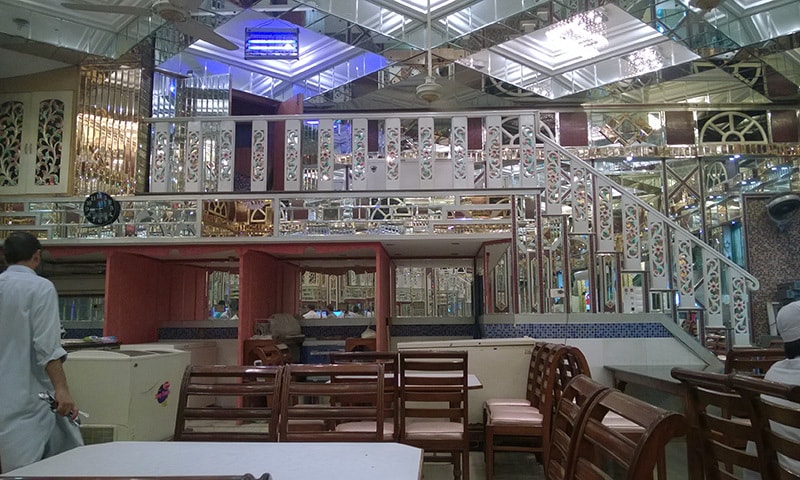 |
| Mashallah Nafees' impressive interior is the work of the owner's daughter — Photo by the author |
Sitting in the corner of the hall at a table with two friends was a lawyer, Saadat Ali, slurping away his faluda. “They have the real taste of pure Kasuri faluda that I’ve tried. Their environment and presentation is all perfect. I’ve tried almost all famous faluda points in Lahore and also visited Kasur especially for this dessert. So I can say it’s the best amongst all in Lahore. Both quality and quantity, perfect cleanliness and accurate mixture of ingredients makes this the best bowl of faluda,” he said, gesturing to his fast diminishing serving.
Al-Fazal
Our next stop was Al-Fazal, which is right opposite the popular and scrummy Goga Naqibia on Temple Road. We were welcomed by a water tanker parked inappropriately right in front of the shop.
The interior of Mashallah Nafees Kasuri Faluda had raised our expectations so high that this intrusive eyesore deflated them before we even entered Al-Fazal . It was like any usual dairy products shop anywhere in the city. The board above the entrance should have carried the shop's name, but instead displayed the entire menu unusually through pictures of everything they sold, right next to a depiction of Baba Bulleh Shah.
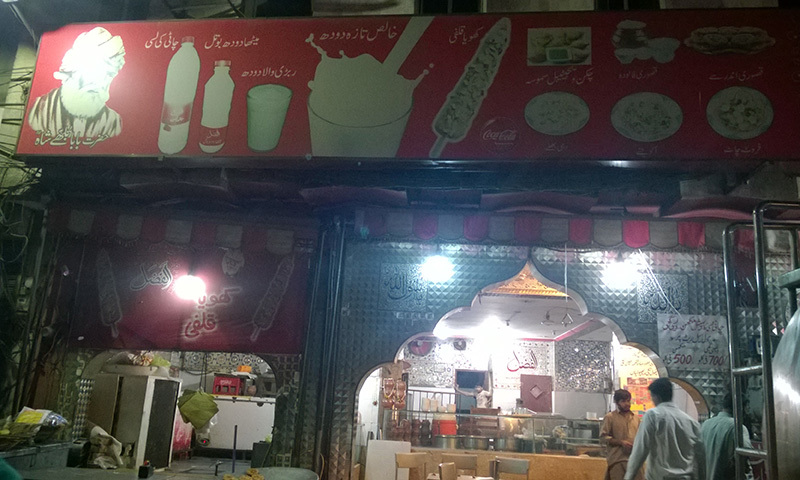 |
| Baba Bulleh Shah graces the Al-Fazal board instead of the shop's name — Photo by the author |
Seeing hardly any activity, we thought it was closed, but were told it wasn’t. So we took the sole table there and asked for a small bowl of faluda. Unlike Nafees Kasuri, they offered small and large bowls for Rs90 and Rs120 respectively. The faluda's messy presentation made it look unimpressive despite having the same elements as our previous sample. It tasted slightly stale, as if it had been prepared early in the morning. It was obvious and the workers seemed uninterested. We requested a waiter to spare a few minutes for us.
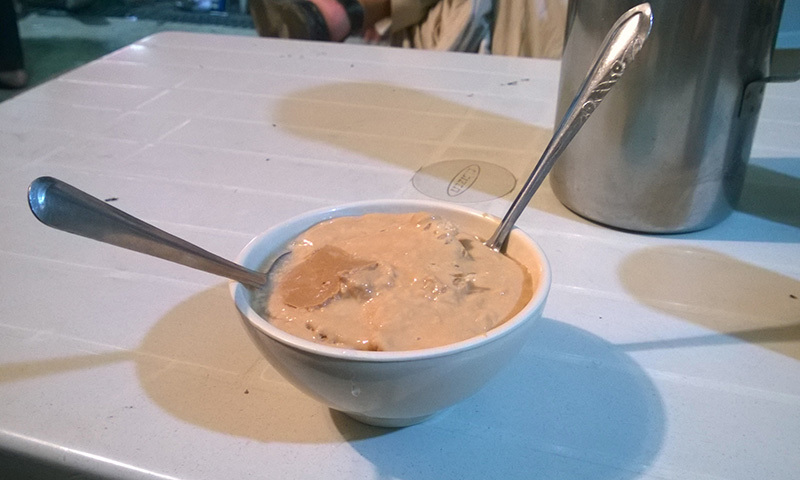 |
| Al-Fazal's faluda wasn't as fresh as one would have liked — Photo by the author |
“This business must be around eight to nine years old. We have at least 20 to 25 branches in Lahore. The owner, Mehr Jajj, is from Kasur and sits at the shop’s General Hospital branch. They have a few branches in Kasur also. We sell an assortment of refreshing beverages, desserts and snacks, including Rabri Milk, Milk with Almond and Cardamom, Fruit Chaat, Ras Malai, Dahi Bhallay, fish in the winters, Kheer and Chaati Lassi. Our most popular items are the lassi, faluda and milk. When the faluda business slows down in the winters, we offer the hot and nutritious Doodh Jalebi,” explained the waiter Sarfaraz, while customers kept coming to purchase their bottled milk that’s apparently quite in demand in the area.
Not too happy, we decided to head over to the unofficial ‘hub of faludas’, Anarkali. One of the streets there is lined with brightly lit shops, old and new, selling the scrumptious dessert with their own variations (the end of this street is the start of Lahore's famous food street). That was my lucky night!
Lasani Faluda Shop
Our first stop in Anarkali was Lasani Faluda Shop or Almashhoor Lasani Faluda Shop, as they owners would like to call it. It was a wide, orderly shop with space both inside and outside to sit. Besides faluda, their other specialty is rabri milk, but they also sell ras malai, plain milk and kheer.
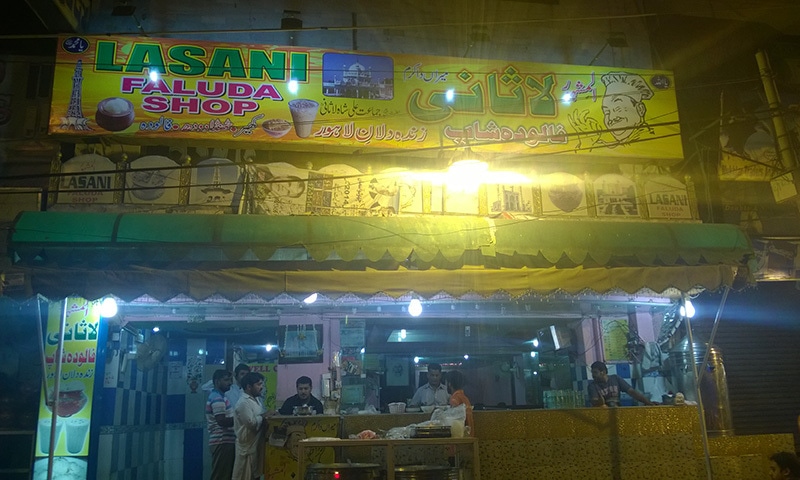 |
| Lasani Faluda Shop — Photo by the author |
We ordered our bowl of faluda that cost us Rs80 for a small serving and Rs130 for a large serving. All faluda sellers in Anarkali seemed to have kept their prices the same.
 |
| Lasani Faluda's special ingredient is cardamom — Photo by the author |
This particular faluda contained the same elements as the previous ones, the only difference being that the kulfi was cone-shaped and was sprinkled with crushed almonds on top. It not only looked a bit different from the ones I had before, but also had a distinctive taste. Cardamom was the dominant flavour I could clearly taste as soon as I took the first bite after mixing up everything in the bowl. It was also slightly sweeter and had less crushed ice than the previous two I had.
Owner Amir, while sitting behind the counter and clearing payments, told me his great-grandfather (whose picture could be seen hanging inside the shop) started this business around 20 years ago.
“The shop has been named after our pir Syed Jamaat Ali Shah Lasani. This is our only branch in the city and anyone selling with the same name is a fake. We’re open in the winters too but only serve a few customers a day. A lot of our customers are visitors to Lahore who come to see the historic Anarkali and spot faluda here, which fascinates them,” the young man told me.
On asking him about how faluda is prepared, Amir told me that the rabri is first made with milk and khoya and cooked for around six to eight hours till it gets thick and has the right consistency. Then if they want to make kulfi, they add some sugar to the rabri mixture and freeze it.
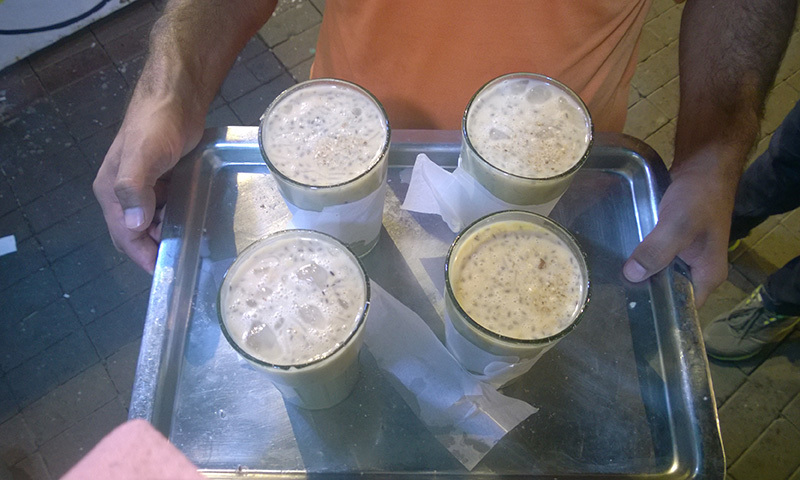 |
| Another one of Lasani's specialities - the rabri milk — Photo by the author |
A group of boys was sitting behind us and enjoying various desserts: milk, ras malai, faluda and rabri. One of them, Salman, a student, said: “We always come here as it's open during our spare time and offers the best faluda in town. We have been coming here for many years and think the others are no match for Lasani.”
Riaz Faluda
Right next door was another decades-old shop, Riaz Faluda, which I had heard about a lot but never had the opportunity to try. Neither its exterior nor interior was as impressive as its neighbours'. The small families-only seating space inside seemed closed and I could see an old man sleeping on one of the benches. So we sat outside on rickety plastic chairs and asked one of the waiters to wipe the table. There were two more tables in front of the shop and one set up in a corner for ‘families’.
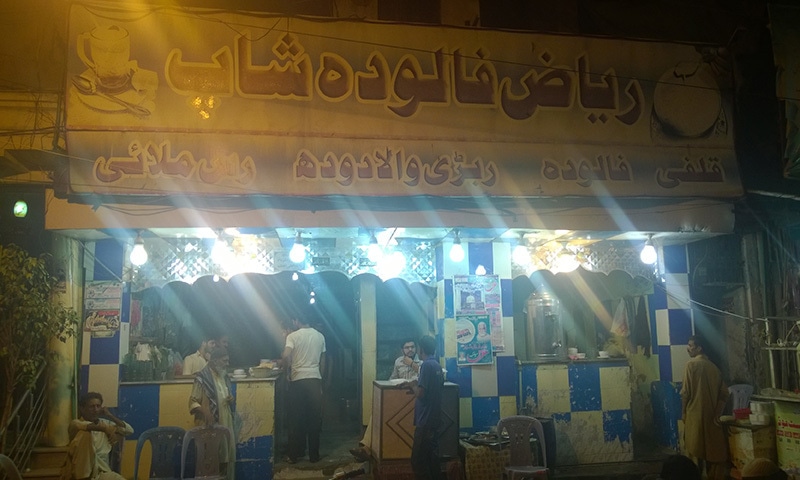 |
| Riaz Faluda didn't look as impressive as its neighbouring shops — Photo by the author |
The faluda looked exactly the same as Lasani’s with same elements as everyone else, just that their rabri was a bit thicker. The taste was also very similar. We ordered a small bowl and gulped it down in a few minutes.
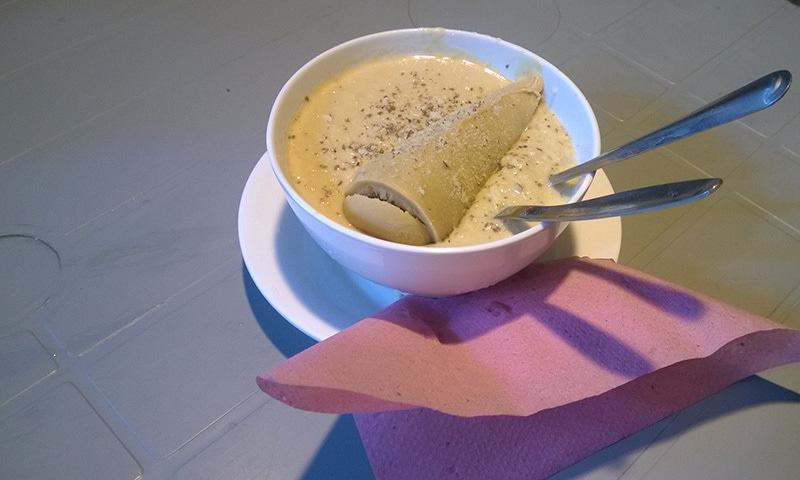 |
| Riaz Faluda is for those who like thicker rabri — Photo by the author |
I then headed to the counter to chat with a man whom I presumed was the owner, fully expecting that his great-grandfather or grandfather must have opened the shop in Lahore... and I was right.
Ahmed Hassan was his name and he told us that his grandfather, Malik Merajdin, started this business 40-50 years ago and named it after his eldest son, Riaz.
“My grandfather went to Kasur, got the idea from there and opened a shop here. We have four branches in Lahore, the other three being in Samanabad, Iqbal Town and Bilal Ganj. On the menu, we have three types of faludas: rabri kulfi, kulfi and a simple rabri faluda, as well as ras malai, rabri milk and kulfi. When winters set in, we offer green tea and tea to compensate for the slow sales of our flagship item, the faluda. In the summer, we sell roughly around 300-400 bowls of faluda a day,” he added. While talking to Hassan, I noticed the waiters bringing glasses of rabri milk or bowls of faluda to him to sprinkle the crushed almond on top before serving to customers.
Yousaf Faluda
By this time, my friend ‘Hafiz’ — as we like to call him — and I were more than full and couldn’t have anymore. But smack in the middle of a street selling only faluda, we couldn’t go back home without having another. We had to choose between the most popular one in Lahore, Yousaf, or the unheard-of and relatively new Baghdadi. We decided to go with the former.
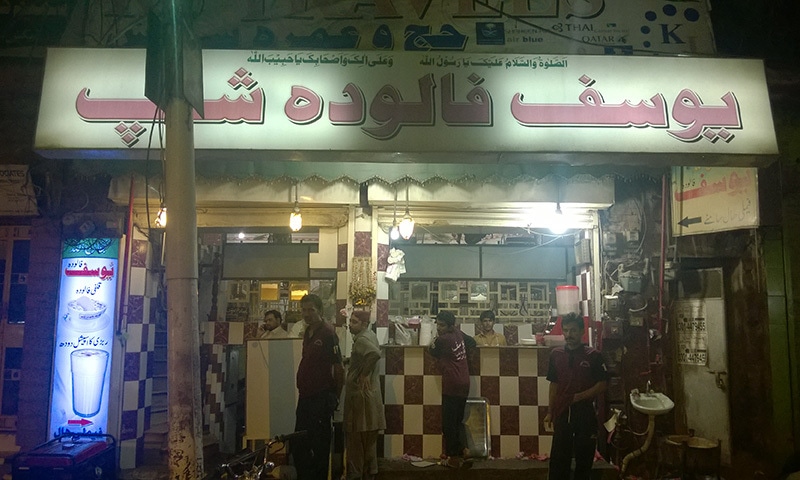 |
| Yousaf Faluda — Photo by the author |
What’s interesting about Yousaf Faluda is that it has two shops right opposite each other to cater to the hordes that they get each day, according to the owners, and a third set-up on the same street, a family hall a few yards away. So up we climbed the stairs to the sitting area in the main shop that had three blocks, each separated with a curtain. As soon as we stepped off the last stair, I noticed a sign in front of me saying, among other things, that one couldn’t sit idle in the hall (“Hall mein fazool bethna mana hai”).
 |
| 'Eat and leave' seems to be Yousaf Faluda's motto — Photo by the author |
My friend and I ordered our standard one small bowl to share, but both of us kept insisting the other finish it off. Sigh. I had to give in. The first thing I noticed as I mixed up everything was that they had added tukh malanga in it, which none of the others had. The faluda tasted delicious, of course, and had an unavoidable tinge of kewra in it. The remaining elements were the same. No wonder it’s the most popular in the city.
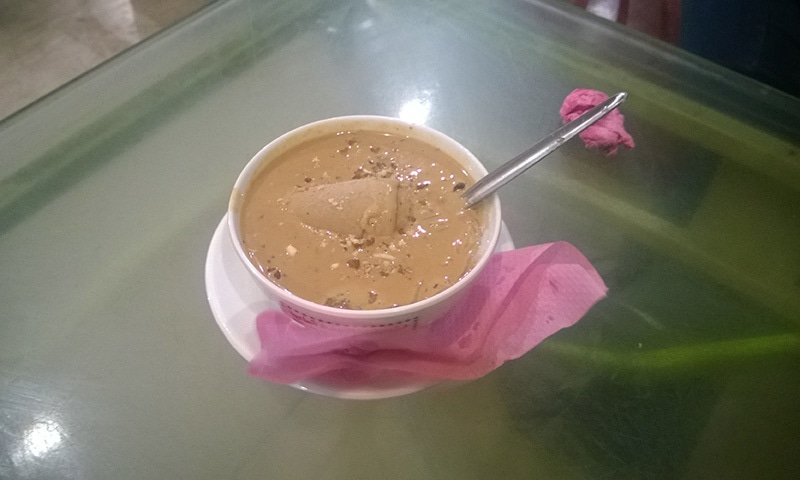 |
| Kewra is Yousaf Faluda's special ingredient — Photo by the author |
Their menu was quite interesting; while the other faluda shops just served more faluda in their large bowls, Yousaf Faluda offered two cones of kulfi. Besides that, they sold ras malai, kheer, rabri milk, ras malai faluda and a simple faluda without kulfi. After wiping the bowl clean, we climbed down the stairs to talk to the man sitting behind the counter.
A pleasant old man, Haji Haider told us that his elder brother started this business whom this shop was also named after. Initially he couldn’t recall how old it was, but after pushing a little, he said it was started in 1958 (57 years ago) and claimed it was the oldest faluda shop in Anarkali.
“We have only one other branch that is in Johar Town and is run by my younger brother. My brother who started this shop here was selling faluda in Kasur before he moved to Lahore,” he said. On asking about the timings he said, they sat in 24-hour shifts, joking that “maut aur gahak ka kya pata (you never know when death and a customer could come for you)”.
“Cold milk and ras malai are the next most-sold items after faluda. And in winters we offer Kashmiri pink tea and gajar ka halwa. We cook our rabri for five to six hours, which gives us this quality and that we pay bills worth thousands for,” he went on.
I specifically asked him about adding tukh malanga, which nobody else we had tried had added. “It has a cool effect, that is why we add it. Also, our customers demand it,” Haji Haider said. About the reason behind their success, Haji sahab modestly said, “Naseeb naseeb ki baat hoti hai (It all depends on one's fate).”
And with a goodbye to Haji Haider, we decide to end our little faluda adventure or both of us would explode. We could barely walk straight. But we had no regrets for sure.
The verdict
The common factors that all the faluda places I visited that night shared were the price, except for a difference of not more than Rs10; their histories, how they started out; the fact that young men had now taken over their family businesses; the owners used similar words to describe the reason behind their product being better that the rest; and all boasted about its alleged health benefits.
If I had to rate the faluda shops we tried, I would definitely rank Mashallah Nafees Kasuri Faluda at the top only because of its 'genuine' taste and presentation, the interior of the shop and the cleanliness they had maintained there.
Very close behind would be both Lasani and Yousaf for the tinge of sweetness that I prefer, followed by Riaz and then Al-Fazal at the end. I know what I’ll be recommending my friends and family now. And I’m definitely going back to a couple of them once summer properly sets in. My love for all things sweet made it a thoroughly enjoyable experience!


